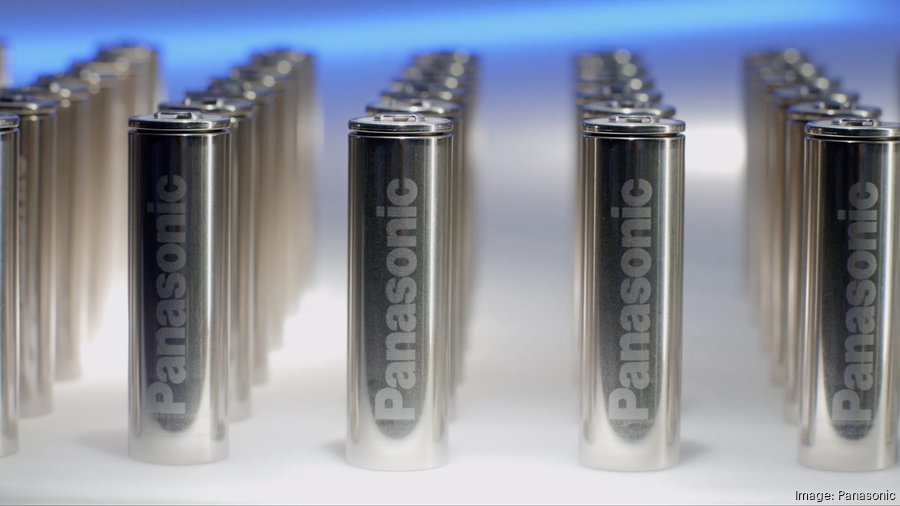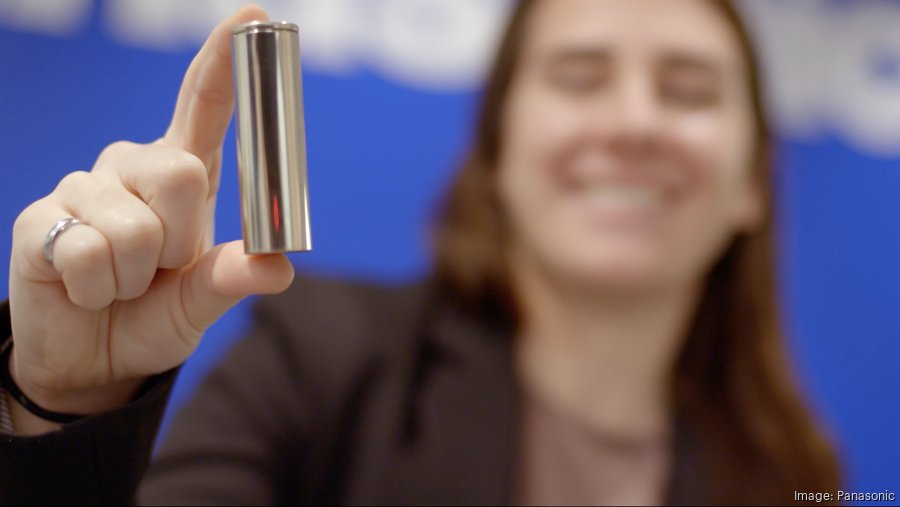Kansas and the Kansas City region are riding high after winning the megaproject known for months only as Project Ocean.
Plans by Panasonic Energy Co. Ltd. to build a $4 billion electric-vehicle battery plant in De Soto bring the promise of 4,000 jobs. More than that, they position the region as a new player amid a sea change in how the world powers vehicles and other products of everyday life.
“We will be the production epicenter for batteries that will power the increasing demand for EVs and a more sustainable world,” Gov. Laura Kelly said at a July 13 news conference. “A new facility of this size is transformational not only for Johnson County, but also for the surrounding area. ... We’ve shown that the state of Kansas is truly a winning investment for companies small, large and mega-sized.”
Powering up
Panasonic plans to produce a new type of battery at the De Soto plant. The 4680 cell is a leap forward technologically, offering advantages in power capacity and ease of use. It is a key feature of Tesla Inc.’s Model Y.
Demand for electric vehicles is surging, even as overall new-car sales have lagged. Sales of electrified vehicles — battery, hybrid or fuel-cell powered — rose nearly 13% during the second quarter compared with a year earlier, according to Kelley Blue Book. During the quarter, electrified vehicles made up 12.6% of the U.S. market.
Panasonic has worked with EV leader Tesla for years. The two share the Gigafactory Nevada, and Tesla is incorporating the 4680 battery in its Model Y, produced at its new factory in Austin, Texas.
“With the increased electrification of the automotive market, expanding battery production in the U.S. is critical to help meet demand,” Panasonic Energy CEO Kazuo Tadanobu said in a July 13 release.
The company plans to build a 2.5 million-square-foot plant on 309 acres at the former Sunflower Army Ammunition Plant, according to documents filed with De Soto. Documents include provisions for a possible second-phase facility of a similar size on 296 acres.
An APEX competitor
Another product of the plant also interests state and local officials: jobs.
The facility is expected to generate 4,000 direct jobs. That would rank Panasonic No. 11 on the Kansas City Business Journal’s most recent Private-Sector Employers List. And although Panasonic would share that slot with Amazon.com Inc., the battery plant expects to pay employees $50,000 a year on average.
Officials anticipate the De Soto plant creating an additional 4,000 jobs for suppliers and local businesses, as well as 16,500 construction jobs. All told, the project will generate $2.5 billion in annual economic impact, according to a study by Wichita State University.
The effort to win this huge prize required literally changing the rules of economic development in Kansas.
In January, state officials asked the Legislature to fast-track a measure massively increasing incentive offerings. The Attracting Powerful Economic Expansion (APEX) program allows a megaproject and as many as five suppliers to receive as much as $1.3 billion in refundable investment tax credits, payroll cost rebates and other subsidies.
The effort attracted tight scrutiny, and some controversy, because of the size of the potential incentives and the mystery involving their target. Knowledge of the company behind Project Ocean was confined to Kelly, top legislative leaders and Commerce Department officials; nondisclosure agreements kept other lawmakers in the dark.
Kelly signed the measure into law in February. Soon afterward, NHK World-Japan reported that Panasonic was choosing between Kansas and Oklahoma for a new battery plant.
Incentives duel
Ultimately, Kansas extended Panasonic an $829 million state incentive package. This includes investment tax credits; payroll rebates; reimbursement of costs to educate, train and relocate workers; and a sales tax exemption on construction materials. The Kansas State Finance Council unanimously approved the package on July 13 after a 45-minute closed-door meeting.
Oklahoma had extended an $848 million package of state and local incentives to lure Panasonic to the city of Pryor. A $300 million tax increment financing district, half meant for Panasonic and the rest for local jurisdictions, stalled when nearly 2,400 residents signed a referendum petition to put the measure on the November ballot. The petition is subject to an ongoing court challenge.
Although Panasonic’s total incentive haul in Kansas isn’t near the $1.3 billion provided for by the APEX program, it still probably will approach — or exceed — $1 billion.
On July 21 (after this edition went to press), the De Soto City Council was expected to approve two 20-year tax increment financing project plans in the northern area of the former Sunflower plant. TIF recovers increased property taxes generated by a project to help reimburse development costs.
The initial $4 billion megaproject is expected to generate $202.6 million in TIF. Another $200 million in revenue is projected to follow if Panasonic builds a $4 billion second-phase facility.
Panasonic and landowner Sunflower Redevelopment Group won’t necessarily receive all of the TIF revenue. Site delivery costs for the two plan areas have been estimated at $100 million and $55 million. A future development agreement with De Soto will determine specific sums that the entities can receive on a pay-as-you-go basis.
In June, De Soto approved an expression of intent to give Sunflower Redevelopment a sales tax exemption on construction materials used on new infrastructure to make the first megaproject site pad-ready.
NEW BATTERY PROMISES BETTER RANGE, MORE POWER

De Soto's coming Panasonic plant will manufacture the 4680 battery for Tesla Model Y cars made in Austin.
Telsa said the battery is five times more efficient, increases range by 16% and has six times the power of previous batteries.
The lithium-ion 4680 battery was unveiled in 2020. Its name comes from its specs: 46 millimeters in diameter and 80 millimeters tall; Tesla packs thousands of the batteries together to power its vehicles. The battery does not have tabs, which eliminates the need for welding. It’s bigger than the battery the Model Y uses now, called 2170.
Panasonic has its own plan for making 4680 batteries. It developed a method to slow the battery’s degradation from a higher voltage, an executive recently told Reuters. High voltages allow the battery to store more energy but typically cause its performance to decrease. Panasonic also created a way to prevent “microcracking,” or chips in the positive electrode when the battery is charged, that can shorten its lifespan.
Munro & Associates, an engineering and manufacturing consulting firm, called the 4680 structural battery pack mind-blowing. The pack is attached to the seats and center console, which together weigh 1,198 pounds. The battery pack still is being tested.
— Ellen Cagle
